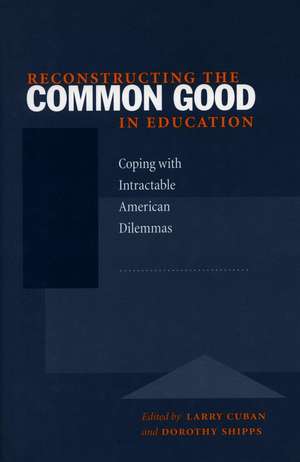Reconstructing the Common Good in Education: Coping with Intractable American Dilemmas
Editat de Larry Cuban, Dorothy Shippsen Limba Engleză Hardback – 30 apr 2000
For almost two centuries, Americans expected that their public schools would cultivate the personal, moral, and social development of individual students, create citizens, and bind diverse groups into one nation. Since the 1980s, however, a new generation of school reformers has been intent on using schools to solve the nation’s economic problems. An economic justification for public schools—equipping students with marketable skills to help the nation compete in a global, information-based workplace—overwhelmed other historically accepted purposes for tax-supported public schools.
Private sector management has become the model for public school systems as schools and districts are “downsized,” “restructured,” and “outsourced.” Recent reform proposals have called for government-funded vouchers to send children to private schools, the creation of self-governing charter schools, the contracting of schools to private entrepreneurs, and the partnerships with the business community in promoting new information technologies. But if there is a shared national purpose for education, should it be oriented only toward enhancing the country’s economic success? Is everything public for sale? Are the interests of individuals or selected groups overwhelming the common good that the founders of tax-supported public schools so fervently sought?
This volume explores the ongoing debates about what constitutes the common good in American public education, assessing the long-standing tensions between shared purposes and individual interests in schooling. It shows how recent school reform efforts, driven by economic concerns, have worsened the conflict between the legitimate interests of individuals and society as a whole, and demonstrates that reconstructing the common good envisioned by the founders of public education in the United States remains essential and unfinished work.
Private sector management has become the model for public school systems as schools and districts are “downsized,” “restructured,” and “outsourced.” Recent reform proposals have called for government-funded vouchers to send children to private schools, the creation of self-governing charter schools, the contracting of schools to private entrepreneurs, and the partnerships with the business community in promoting new information technologies. But if there is a shared national purpose for education, should it be oriented only toward enhancing the country’s economic success? Is everything public for sale? Are the interests of individuals or selected groups overwhelming the common good that the founders of tax-supported public schools so fervently sought?
This volume explores the ongoing debates about what constitutes the common good in American public education, assessing the long-standing tensions between shared purposes and individual interests in schooling. It shows how recent school reform efforts, driven by economic concerns, have worsened the conflict between the legitimate interests of individuals and society as a whole, and demonstrates that reconstructing the common good envisioned by the founders of public education in the United States remains essential and unfinished work.
Preț: 777.35 lei
Preț vechi: 1009.54 lei
-23% Nou
Puncte Express: 1166
Preț estimativ în valută:
148.78€ • 153.33$ • 125.61£
148.78€ • 153.33$ • 125.61£
Carte tipărită la comandă
Livrare economică 03-17 martie
Preluare comenzi: 021 569.72.76
Specificații
ISBN-13: 9780804738620
ISBN-10: 0804738629
Pagini: 304
Dimensiuni: 152 x 229 x 25 mm
Greutate: 0.54 kg
Ediția:1
Editura: Stanford University Press
Colecția Stanford University Press
ISBN-10: 0804738629
Pagini: 304
Dimensiuni: 152 x 229 x 25 mm
Greutate: 0.54 kg
Ediția:1
Editura: Stanford University Press
Colecția Stanford University Press
Recenzii
"Every library with serious contemporary affairs or education collections will want this intelligent book."—C. A. Cunningham, University of Chicago
". . . . This book does something that is unique in our headlong rush to change, reform, punish, or criticize education. Its thoughtful essays pause and reflect on what public education means in America. . . . [Reconstructing the Common Good in Education] is relevant for both historians and those in education policy. . . .[It] provides useful ideas and material for both."—American Studies International
Notă biografică
Larry Cuban is Professor of Education at Stanford University. He is the author, most recently, of How Scholars Trumped Teachers: Change Without Reform in University Curriculum, Teaching, and Research. Dorothy Shipps is Assistant Professor of Education at Teachers College, Columbia University.
Textul de pe ultima copertă
“Every library with serious contemporary affairs or education collections will want this intelligent book.”—C. A. Cunningham, University of Chicago
“. . . . This book does something that is unique in our headlong rush to change, reform, punish, or criticize education. Its thoughtful essays pause and reflect on what public education means in America. . . . [Reconstructing the Common Good in Education] is relevant for both historians and those in education policy. . . .[It] provides useful ideas and material for both.”—American Studies International
“. . . . This book does something that is unique in our headlong rush to change, reform, punish, or criticize education. Its thoughtful essays pause and reflect on what public education means in America. . . . [Reconstructing the Common Good in Education] is relevant for both historians and those in education policy. . . .[It] provides useful ideas and material for both.”—American Studies International
Descriere
What constitutes the common good in American public education? This volume explores the ongoing debate between those who expect schools to cultivate citizens through personal, moral, and social development, as well as to bind diverse groups into one nation, and a new generation of school reformers intent on using schools to solve the nation's economic problems by equipping students with marketable skills.
